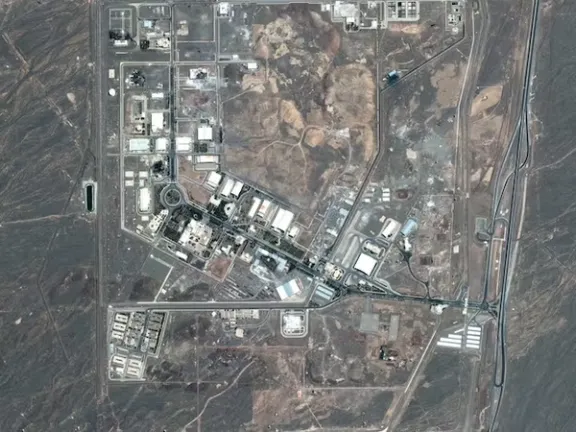Iranian MP Links Exchange Rate Surge To Israeli Consulate Attack
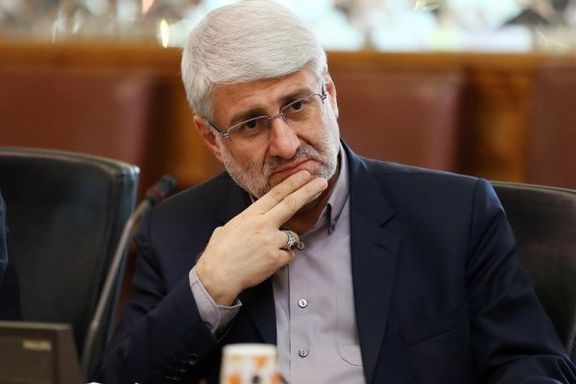
MP Mohammad Hossein Farhangi has attributed the recent surge in Iran's exchange rate to heightened concerns following Israel's recent attack.

MP Mohammad Hossein Farhangi has attributed the recent surge in Iran's exchange rate to heightened concerns following Israel's recent attack.
Farhangi said, “Israel's efforts to escalate tensions had psychological impacts on various markets.”
Last week Israel struck the Iranian consulate in Damascus killing a key IRGC commander and several other staff at what is believed to be a major IRGC center hidden within the diplomatic compound.
Over the weekend, Iran's currency, the rial, experienced another historic low, breaching the 650,000 threshold to reach 653,000 per US dollar. The spike represents a nearly 30 percent decline for the rial since the beginning of January, marking the highest exchange rate ever recorded for the American currency in Iran.
The increased tensions with Israel have fueled fears of potential Iranian retaliation with calls all the way to the Supreme Leader to strike back, further driving up the price of the US dollar in Iran. However, the exchange rate slightly dropped to 647,000 on Monday as Iranian officials exercised caution in their response to the attack.
The devaluation of the Iranian rial has been a persistent trend since the 1979 revolution, with a significant escalation occurring in 2018 following the US withdrawal from the JCPOA nuclear deal and the imposition of sanctions on Iran's oil exports and banking sector.
In 1978, the rial was valued at 70 rials per dollar. Over the years, the continuous devaluation has exacerbated inflationary pressures, pushing millions of Iranians below the poverty line. While official government figures suggest an annual inflation rate of over 40 percent, many experts believe the actual rate to be even higher, exacerbating economic challenges for ordinary Iranians.

An Israeli strike on southern Lebanon early on Monday killed a field commander in the heavily-armed Iran-backed Lebanese group Hezbollah, as the United Nations warned that shelling was spreading.
Hezbollah and the Israeli military have been exchanging fire across Lebanon's southern frontier in parallel with the Gaza war, adding to fears of a wider regional conflict.
Early on Monday, Israeli fighter jets hit the village of al-Sultaniyah and killed a field commander in Hezbollah's elite Radwan units and two other people, the Israeli military and two Lebanese security sources said.
The Israeli military identified the commander as Ali Ahmed Hassin, and said he was responsible for planning and executing attacks against Israelis. Hezbollah issued a funeral notice for Hassin but without details of his role.
Israeli strikes have killed around 270 Hezbollah fighters in the last six months as well as around 50 civilians, including children, medics and journalists. Hezbollah's rocket fire has killed around a dozen Israeli soldiers and half as many civilians.
In a joint statement on Monday, United Nations' Special Coordinator for Lebanon Joanna Wronecka and the commander of the UN peacekeeping mission in Lebanon, Aroldo Lazaro, said the violence must stop.
"The unrelenting cycle of strikes and counterstrikes in breach of the cessation of hostilities constitute the most serious violation of Security Council Resolution 1701 since its adoption in 2006," they said.
That UN decision ended a month-long war between Hezbollah and Israel nearly two decades ago but many of its points - including a withdrawal of armed groups from the south and deployment of Lebanese army troops - were never implemented.

The head of Iran’s Atomic Energy Organization, Mohammad Eslami, has said the country is entering a new phase in its nuclear development.
Speaking on the occasion of National Nuclear Technology Day, Eslami emphasized ongoing progress in the development of nuclear reactors, particularly highlighting the current stage of concrete pouring.
"We will witness the first concrete pouring at Phase 3 of Bushehr Power Plant in the month of May," stated Eslami.
Earlier statements from Eslami outlined Iran's ambitious plans, including a $50 billion investment for constructing new nuclear power plants capable of generating 10,000 megawatts of electricity. However, this capacity remains insufficient to meet the country's total energy needs.
Iran's heavy reliance on nuclear energy stems from decades of neglecting investment in alternative power sources, particularly renewables. This lack of diversification leaves the country vulnerable to energy shortages, especially considering its isolation in the global community.
Currently, Russia stands as Iran's sole partner in the nuclear industry. The Bushehr power plant, commissioned by Russia in 2011, operates one unit generating 1,000 megawatts, contributing less than two percent of Iran's total electricity output. However, construction projects for phases two and three of the Bushehr Nuclear Power Plant have reportedly accelerated.
The Bushehr reactor remains unaffected by the ongoing nuclear dispute between the West and Iran, as Russia manages the nuclear fuel cycle for the facility. However, Iran has continued its uranium enrichment activities and accumulation of purified fissile material at other undisclosed locations I spite of sanctions.
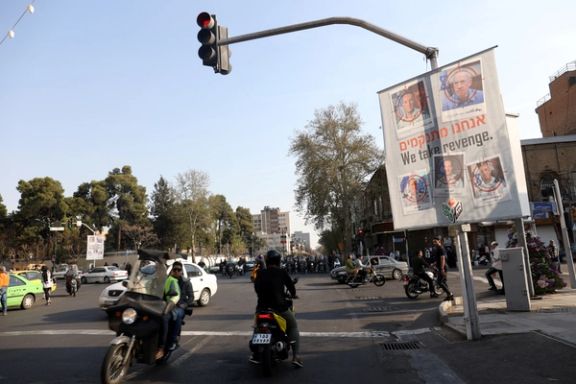
An unconfirmed, single-sourced report is alleging that Tehran promised Washington it would not retaliate to last week’s Israel’s airstrike, which killed several of the regime’s senior Islamic Revolutionary Guards commanders in Syria.
The alleged condition for Iran’s restraint? A ceasefire in Gaza.
That report by Jadeh Iran – unconfirmed by Iran International – is now circulating not just on social media, but has landed in the pages of Israeli news outlets.
Notably, the Iranian regime’s own propaganda media outlets are also giving it credence, including semi-official ILNA and Shahre Khabar.
But, who does this narrative serve? And, where is the original report coming from?
It’s true, the Biden administration, increasingly under pressure to find a solution to Israel’s relentless pounding of Gaza, would certainly benefit from a ceasefire – not in the least at home where several polls show a difficult road ahead for President Joe Biden campaign to hold-on to another term against Donald Trump.
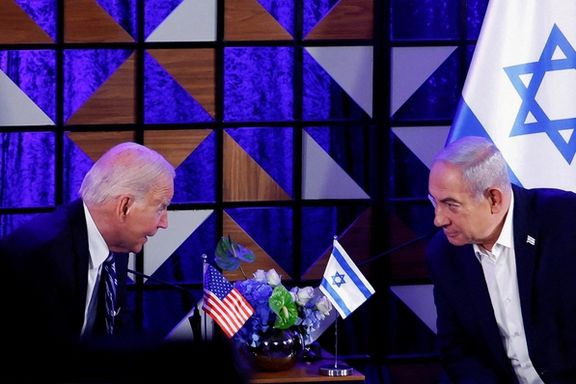
On Iran’s side – desperate to get sanctions relief and already embroiled in multiple of its proxy wars in the region – the regime would do well by refraining from retaliating against Israel – and drawing less anger from the US.
In fact, that alleged report, citing only one Arabic diplomatic source, suggested that "If America succeeds in containing the situation, it will be a great success for the Biden administration and we can build on that".
Kuwaiti-based Al Jarida has since cited a source in the Iranian Foreign Ministry claiming that Washington’s latest proposal to Tehran – though a Swiss mediator – is offering direct negotiations with Tel Aviv to reach an understanding, aiming to de-escalate tensions in the region.
Some Iranians on social media meanwhile, quickly reacted to the report suggesting that the report is likely regime propaganda masking the fact that Tehran lacks the courage to retaliate against Israel.
Who is behind the media outlet “Jadeh Iran”?
Written by Ali Hashem, the Arabic piece in the web-based outlet “Jadeh Iran” paints the picture of Tehran in a dilemma between wanting to preserve its dignity after the Damascus attack – and avoiding escalating tensions in the Middle East and with that warning the US against falling into Prime Minister Benjamin Netanyahu's “trap” and seeking a ceasefire in Gaza as a condition for de-escalation.
Hashem, who describes himself as founder of Jadeh Iran also appears to work for Al Jazeera – long known for its pro-Iranian regime propaganda.
When looking on Jadeh Iran’s official Instagram page and the accounts it follows, you will find personalities like: Former Iranian Foreign Minister Javad Zarif, Seyyed Ali Khomeini, Al Jazeera reporters – and plenty of Iranian regime propaganda pages.
Meanwhile, Israel says it has withdrawn troops from southern Gaza for “tactical reasons” – with no indication that this is connected to the alleged report by Jadeh Iran.
Iran’s Retaliation After Killing Of Soleimani
When it comes to Iran’s retaliation, it is hard to predict how the regime will respond.
Over 4 years after the IRGC Quds Force Commander Qassem Soleimani was killed by a US drone strike in Iraq – Tehran maintains it is still seeking to avenge his death.
But, Iran did carry out what it saw as retaliation at the time, just 5 days after Soleimani’s assassination in January 2020.
It launched over 12 ballistic missiles at the al-Asad Airbase in western Iraq, as well as another airbase in Erbil. Notably, Iran reportedly did inform the Iraqi government of an imminent attack shortly beforehand.
No US service members were killed in the attacks, but about 110 did suffer traumatic brain injuries, mainly concussions – leading to much mockery by Iranian dissidents, who joked that Iran’s promised “harsh revenge” merely resulted in the “headaches” of US soldiers.
Iran however, was anticipating a counter-response from the US – but inexplicably made the decision not to close its airspace to civilian flights.
On the same day, just a few hours later, the regime’s IRGC shot down a passenger flight taking off from Tehran headed for Ukraine. Flight PS752 was hit with two surface-to-air missiles, killing all 176 people onboard – including 138 Iranians with ties to Canada.
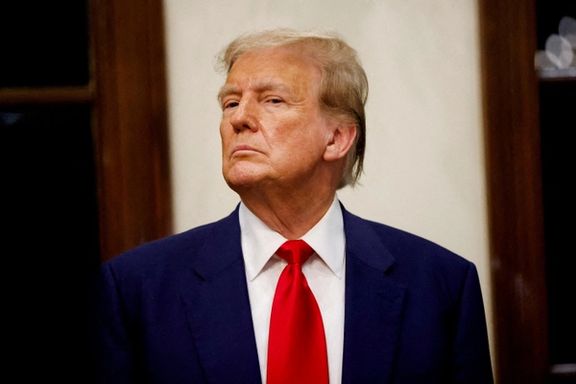
Mirghasem Momeni, an Iranian energy expert, highlighted concerns over the potential return of Donald Trump to power and its impact on Iran's oil market.
"If Trump returns to power, sanctions and pressure on Iran's oil and its oil partners will increase, and efforts will be made to further isolate us, resulting in a reduction in our foreign currency revenues. This will be a political and economic lever for Trump to align Iran with his policies or bring it to the negotiation table," he warned.
Trump's withdrawal from the 2015 nuclear deal, known as the Joint Comprehensive Plan of Action (JCPOA), in 2018, marked the beginning of what he termed 'maximum pressure' sanctions on Tehran.
The move drastically reduced Iran's oil exports to less than 500,000 barrels per day and blocked revenues in foreign banks.
Regarding oil prices, Momeni explained that they are influenced by supply and demand dynamics, international developments, and geopolitical tensions.
He suggested that while clean energy initiatives are gaining traction, fossil fuels remain essential, and any crisis in oil-producing regions could affect prices.
Iran's crude oil production stood at an estimated 3,163,000 barrels per day as of January 2024, showing a slight decrease from December 2023's output of 3,168,000 barrels per day and significantly lower than the 4,376,194 barrels per day Iran was producing in 2016.
Under the Biden administration, both sides of the political spectrum have accused the president of being too soft on Iran, which has continue to accelerate nuclear enrichment, suppress human rights and expand its diplomatic hostage taking policy.
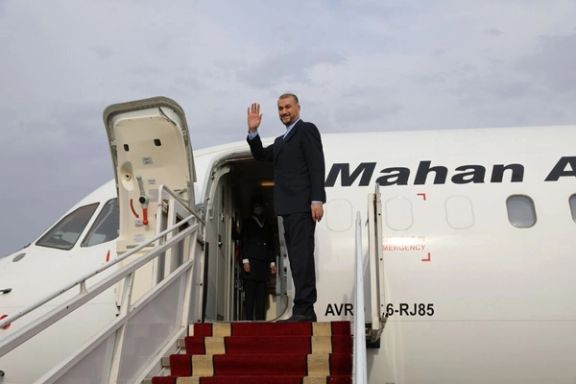
Iran's Foreign Minister departed from Oman to Damascus on Monday in the wake of last week’s airstrike on Iran's consulate in the Syrian capital.
The Israeli attack led to the deaths of seven Revolutionary Guard Corps (IRGC) members including two commanders on the compound believed to be a key base for the IRGC.
Hossein Amirabdollahian is accompanied by Vahid Jalalzadeh, the head of the National Security and Foreign Policy Commission of the Parliament.
Iran has pledged to retaliate for the deaths of its personnel in the strike. A senior adviser to Iran's Supreme Leader warned on Sunday that Israeli embassies were now potential targets.
Amirabdollahian, who initiated his regional tour in Muscat, where he engaged with Omani officials and met with a representative of Yemen's Houthi group, Mohamed Abdelsalam, condemned the attack while in Oman.
"The attack on Iran's embassy building in Damascus is a new step in Israel's warmongering and its attempt to expand war regionally," said Amirabdollahian.
The Omani Foreign Minister, Badr Al-Busaidi, also called for de-escalation during discussions with his Iranian counterpart. Meanwhile, Israel, in line with its usual practice, declined to comment on the incident when approached by media.
Israel's Defense Minister Yoav Gallant had previously stated that Israel was prepared for any potential retaliation from Iran.
